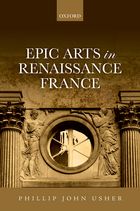
Compte rendu publié dans Acta fabula (Octobre 2014, vol. 15, n° 10) : "Le dialogue des arts dans l’épopée de la Renaissance" par Adeline Desbois-Ientile.
***
Philip Usher, Epic Arts in Renaissance France
Oxford : Oxford University Press, 2013.
EAN 9780199687848.
272 p.
Prix £72
Présentation de l'éditeur :
Epic Arts in Renaissance France studies the relationship between epic literature and other art forms such as painting, sculpture, and architecture. Why, the book asks, the epic heroes and themes so ubiquitous in French Renaissance art are widely celebrated whereas the same period's literary epics, frequently maligned, now go unread? To explore this paradox, the book investigates a number of epic building sites, i.e. specific situations in which literary epics either become the basis for realisations in other art forms or somehow contest or compete with them. Beginning with a detour about the appearance of epic heroes (Odysseus and Aeneas) on marriage chests in fifteenth-century Florence, the study traces how French communities of readers, writers, translators, and artists reinvent epic forms in their own—or their patron's—image. Following extended discussion of three galleries in different regions of France, which all depicted key scenes from the classical epics of Homer, Virgil, and Lucan, the book turns to epics written in the period. Chapters of Epic Arts focus on Etienne Dolet's Fata, which praise the victories (but also failures) of François Ier in ways that make it both a continuum of Fontainebleau and a response to the celebration of French defeat in foreign paintings; on Ronsard's Franciade, whose muse was depicted on the façade of the Louvre and whose story was eventually taken up in a long series of paintings by Toussaint Dubreuil; and on Agrippa d'Aubigné's Protestant Tragiques, which allude to, and frequently function as graffiti over, Catholic works of art in Paris and Rome. Situated at the frontier of literary criticism and art history, Epic Arts in Renaissance France is a compelling call for a revaluation of French epic literature and indeed of how we read.
Phillip John Usher was born in England. He studied French literature at Royal Holloway College, University of London, before pursuing graduate work in Romance Languages at Harvard University. He is currently Assistant Professor at Barnard College, Columbia University, where he is also Chair of Medieval and Renaissance Studies.
Sommaire :
Introduction
1: Homer, Virgil, and Lucan: Classical Epic and Renaissance Art
2: Dolet's Fata: Celebrating François Ier in the Wake of the Battle of Pavia
3: Ronsard's Franciade: From National Genealogy to Tragic Love Story
4: D'Aubigné's Tragiques: A Wasteland of Graffiti
Closing Remarks: From Epic Cassoni to Epic Coffrets